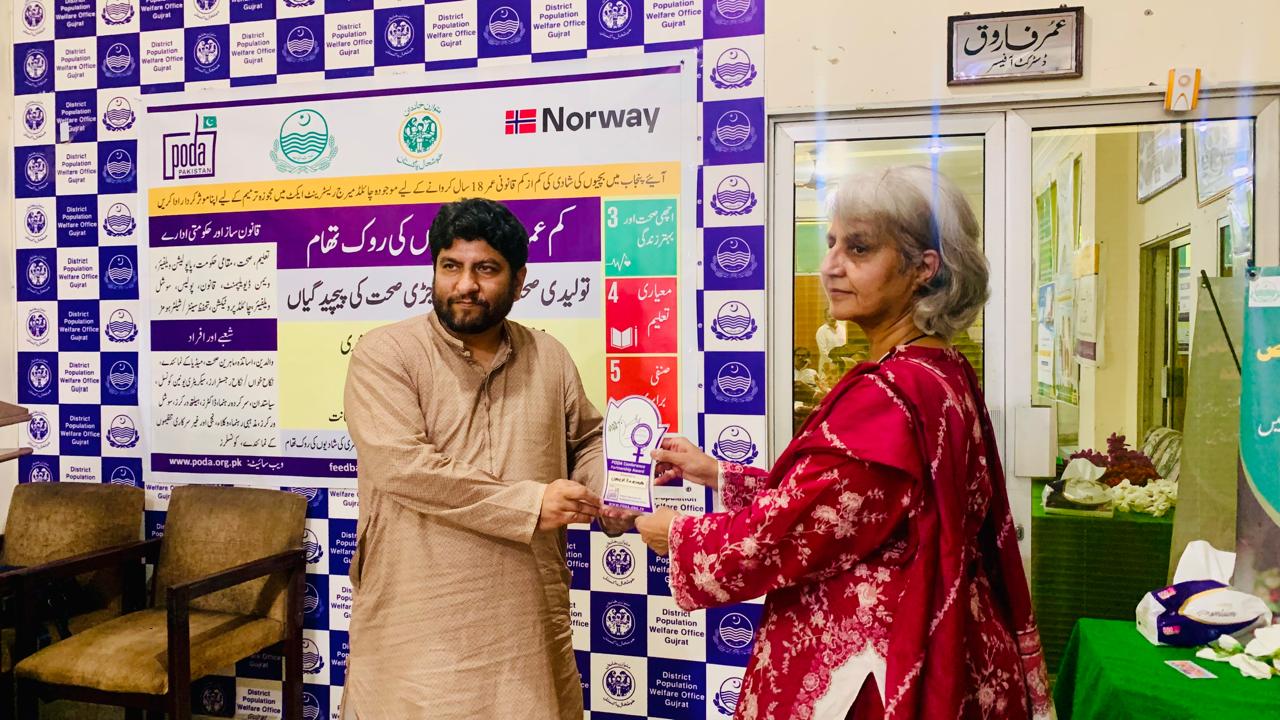
Workshop on SRHR in Gujrat Highlights Health Complications of Child Marriages
Gujrat, Thursday, May 29, 2025 – PODA (Potohar Organization for Development Advocacy), in collaboration with the District Population Welfare Office (DPWO) Gujrat, held a workshop for government officials focused on the health complications linked to child marriages, a major contributor to population growth in Pakistan.
The workshop is part of a three-year project titled “Reduce Early Marriages to Enhance Gender Equality,” being implemented by PODA in 41 districts of Punjab. The project, which began in December 2022 and runs until November 2025, is supported by the Norwegian Embassy in Islamabad.
On this occasion, Nabeela Aslam, Project Manager at PODA, and Umer Farooq, District Population Welfare Officer, signed a letter of coordination to strengthen collaborative efforts aimed at protecting women’s rights and promoting gender equality.
DPWO Umer Farooq emphasized the need to raise awareness of constitutional and fundamental rights, especially among grassroots communities. “Even men are often unaware of their rights in our society,” he remarked. He further stressed that education is the only sustainable way to empower women and protect their rights.
Dr. Kanwal Tabassum, Senior Women Medical Officer (SWMO) from the Department of Health and Population, discussed the grave health implications of child marriage. She noted that young girls often face social isolation, physical abuse, and immediate pressure to bear children. Malnutrition, anemia, and serious pregnancy-related complications such as uterine damage are common. “Her learning stops, she is isolated from her family, and with low haemoglobin, she faces severe pregnancy risks,” Dr. Tabassum warned. “And if she fails to conceive right away, she is compared to animals—‘even our cow gives birth every year,’ she is told.”
Dr. Mehak Anwar, WMO, FHMU Gujrat, added that the frontal lobe of the brain continues to mature until the age of 23, questioning how a mentally and physically immature girl could be expected to carry and raise a child. She highlighted urinary tract infections (UTIs), obstetric fistula, and eclampsia as serious health outcomes of early marriages.
The participants welcomed the passage of a bill by the National Assembly and the Senate—representative bodies of the entire country—to set 18 years as the minimum legal age for marriage for girls and to make the National Identity Card mandatory for Nikah registration in ICT. They welcomed this legislative step as a significant move to combat child marriage and protect adolescent girls. PODA Legal Advisor,
Advocated Khawaja Zahid Nasim responded to the queries raised by the participants.
The workshop concluded with the signing of a joint resolution, in which participants urged the Punjab Assembly to adopt similar legislation at the provincial level. They pledged to continue raising awareness within their communities about the negative impacts of child marriage and to advocate for the rights of adolescent girls, recognizing them as full citizens of Pakistan.
Senior government officials from population, health, social welfare, and local government departments, along with representatives of the media, religious scholars, social activists, and lawyers, participated in the workshop.





